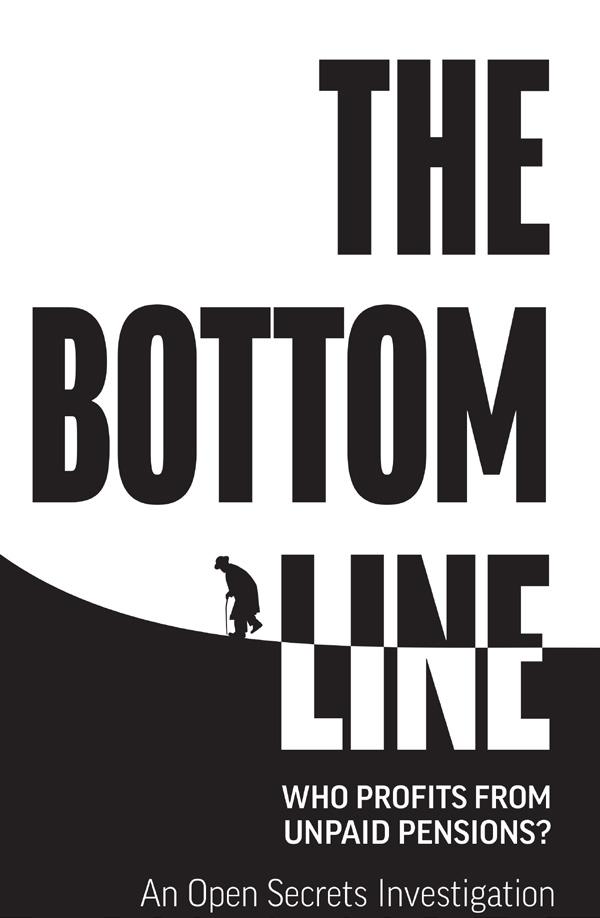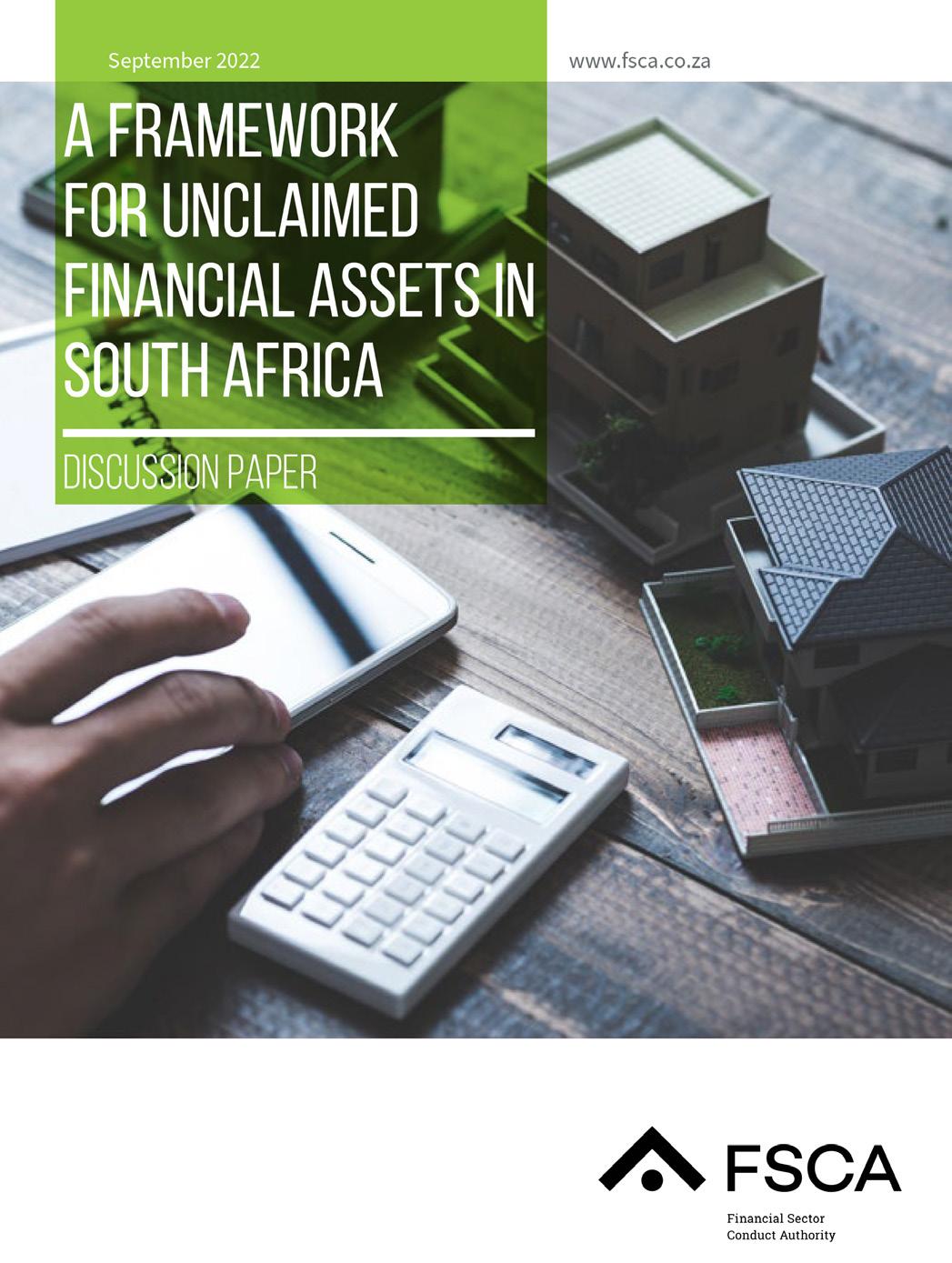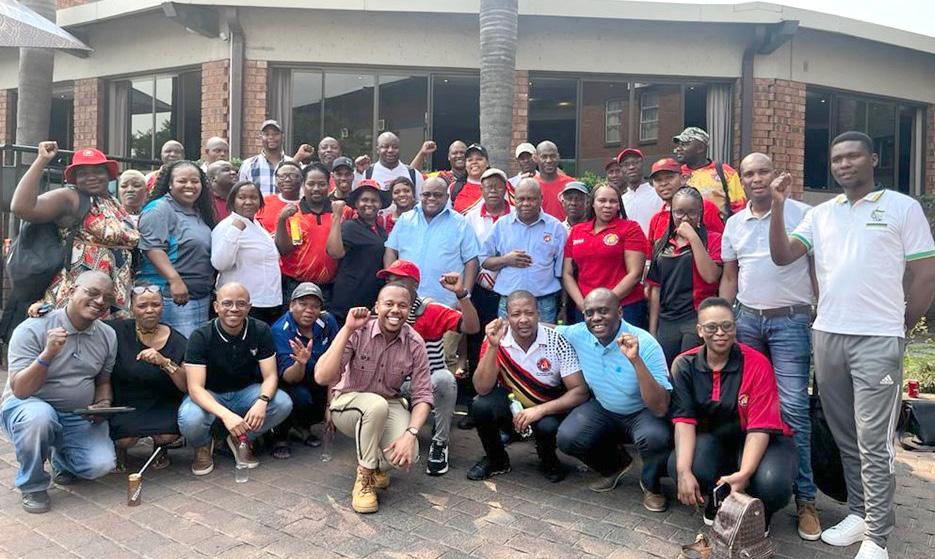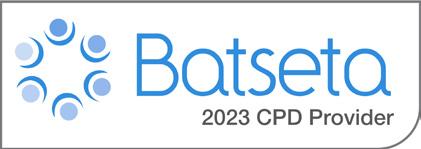


GEPF Public servants & unclaimed benefits TRUSTEES What is your role? WATCHDOG The FSCA’s 13 recommendations UNCLAIMED BENEFITS FOUNDATION This educational publication is funded by Strate and the ASISA Foundation ALSO IN THIS ISSUE: HOW TO CLAIM BENEFITS | THE UNPAID BENEFITS CAMPAIGN | REGULATORY DEVELOPMENTS www.atleha-edu.org Atleha-edu Speaking life into investment decisions VOL.15 UNDERSTANDING THE CHALLENGES AND SOLUTIONS
The ASISA Academy, in partnership with the ASISA Foundation, is offering the following high quality, fully-sponsored, independently delivered Retirement Fund Trustee Education Workshops to South African Retirement Fund Principal Officers and Trustees. The ASISA Academy is an accredited CPD provider for the Batseta Council for Retirement Funds with each workshop carrying 3 Batseta CPD credits








Please email info@atleha-edu.org or call 021 851 0091 for more information. 02 Unclaimed benefits explained 04 Is there an uncliamed benefit with your name on it? Unclaimed benefits - Here's the numbers Trustees and tracing 06 08 Who benefits from unclaimed benefits ...? 11 12 14 A short history of unclaimed benefits CONTENTS 18 And the FSCA discussion paper recommends … Unpaid vs unclaimed 22 Test your learning for CPD credits 14 Trustees and tracing 04 Who benefits from unclaimed benefits ...? Unclaimed benefits and GEPF And the FSCA discussion paper recommends … 16 18 www.atleha-edu.org Atleha-edu Speaking life into investment decisions
RETIREMENT FUND TRUSTEE EDUCATION WORKSHOPS
CONTACT: LEARN@ASISAacademy.org.za www.tinyurl.com/RFTE-ASISA 1. INVESTMENT FUNDAMENTALS 2. RETIREMENT FUND TRUSTEE GOVERNANCE & ETHICS 3. RESPONSIBLE INVESTING 4. DEATH BENEFITS 5. ANNUAL FINANCIAL STATEMENT ANALYSIS 6. INVESTMENT POLICY STATEMENT FORMULATION & ASSESSMENT 7. INVESTMENT MANAGEMENT FEES & COSTS 8. PRIVATE EQUITY 9. INFRASTRUCTURE INVESTING 10. EXCHANGE TRADED FUNDS 11. BENEFICIARY FUNDS, TRUSTS, AND GUARDIAN’S FUND 12. MASTERCLASS IN DEATH BENEFITS 13. BASICS OF ALTERNATIVE INVESTMENTS 14. HEDGE FUNDS 15. INDUCTION COURSE FOR RETIREMENT FUND TRUSTEES
ONLINE HALF DAY WORKSHOPS
UNCLAIMED BENEFITS EXPLAINED
overview
There is currently a pot of R47 billion in the South African economy in the form of unclaimed benefits – money owed to ordinary South Africans. Before we clarify this complicated and sometimes controversial issue, familiarise yourself with these key terms.

Unclaimed assets
‘Unclaimed assets’ is an umbrella term for any assets (money) that remain unpaid or unclaimed to a person by a financial institution such as a retirement fund, insurance and unit trust companies. These assets include retirement fund benefits, bank deposits, life and non-life insurance policies (motor or home insurance), securities (shares) and savings in collective investment schemes.
R88,56 BILLION: The total estimate of unclaimed assets held by financial institutions in South Africa.
Unclaimed benefits
An unclaimed benefit refers specifically to a benefit due from a retirement fund. It includes the following types of benefits:
• Once you retire you receive a retirement benefit.
• If your employment is terminated, you are retrenched or resign, you receive a withdrawal benefit.
• A benefit payable by a fund upon the death of a member is a death benefit.
• A surplus benefit is when a surplus amount in a fund is distributed to active and former members.
If the fund member or beneficiary does not claim a benefit within 24 months from the due date, it is classified as “unclaimed”.
Inactive account
A bank account where no transactions are taking place – no deposits, payments, etc. are made.
Unpaid monies from these institutions do not qualify as unclaimed benefits:
• South African Revenue Service
• Road Accident Fund
• Medical schemes
• Compensation Fund
• Guardian’s Fund
• Loyalty programmes
• Informal arrangements like stokvels and burial societies
Dormant account
An account that has been inactive for a period specified by the bank. Currently, these periods differ between banks, ranging from two to 24 months.
Lost account
An account where the owner or beneficial owner of the account cannot be located.
Beneficiaries
Beneficiaries of the pot of unclaimed benefits include pensioners, spouses and/or children of fund members, and other beneficiaries nominated by the fund member. As you can see, these unclaimed benefit assets have the potential to impact many lives and households across the South African landscape for the better.
4,45 MILLION: The number of beneficiaries from South Africa and neighbouring countries who are owed benefit payouts from retirement funds in South Africa.
Fund administrators
Fund administrators are often businesses within large life insurers, but some are independent and a few big funds are self-administered. Fund administrators are responsible for managing a retirement fund on behalf of the members and trustees. Their responsibilities generally include maintaining accurate records of all members, former members and their beneficiaries, ensuring benefits are paid out per the fund's rules, and communicating with members and beneficiaries on behalf of the fund.
Unclaimed benefit fund (UBF)
Most fund administrators set up dedicated UBFs to preserve unclaimed benefits until the beneficiaries can be traced and paid.
Financial Services Board (FSB)
The FSB was established as a separate government agency on 1 April 1991. It was the regulator of the pension fund sector until March 2018.
Financial Sector Conduct Authority (FSCA)
The FSCA replaced the FSB on 1 April 2018 and is now the market conduct regulator for all financial services sector corporations. In short, the FSCA and the Prudential Authority (PA) are South Africa’s financial watchdogs.
Unclaimed benefits search engine
In 2015 the Financial Services Board (now FSCA) created a search engine to help beneficiaries access their unclaimed benefits. They also offer SMS, email, and written enquiries as well as a toll-free number. To see whether you might be eligible for an unclaimed benefit, visit fsca.co.za (click on Customers and Unclaimed Benefits).
R1,2 BILLION: The amount of money paid out to over 14 000 beneficiaries via the FSCA's unclaimed benefits search engine.
Do I have a claim?
To see whether you might be eligible for an unclaimed benefit, visit fsca.co.za (click on Customers and Unclaimed Benefits) or turn to pg. 11 to read our article - Retirement savings – Is there an unclaimed benefit with your name on it?
Available online at: atleha-edu.org/retirement-savings-is-therean-unclaimed-benefit-with-your-name-on-it/
Association for Savings and Investment South Africa (ASISA) ASISA is a not-for-profit membership organisation that represents the collective interests of most insurance and investment companies in South Africa. Member companies are expected to adhere to certain ASISA standards and guidelines.
REFERENCES
1. asisa.org.za
2. FSCA discussion paper – A Framework for Financial Assets in South Africa 2022
Available online at: tinyurl.com/2p94jpm2
3. FSCA press release – Publication of the FSCA Financial Sector Outlook Study 2022
Available online at: tinyurl.com/34va4sm4
4. smartaboutmoney.co.za
Available online at: https://tinyurl.com/55k6kmph
5. The Bottom Line Report 2019
Available online at: tinyurl.com/msd8xyfj
LEARN MORE
To learn more about this topic, please visit our website www.atleha-edu.org or email us at info@atleha-edu.org to find out more about our educational publications, resources and workshops.
3 2
WHO BENEFITS FROM UNCLAIMED BENEFITS ...?
South Africa has an interesting conundrum. On the one hand, there is a huge pot of unclaimed benefits and on the other hand, citizens who desperately need an income. The solution seems simple. Find the beneficiaries and pay out the money. Unfortunately, this relationship is complicated.
A huge pot of money
Unclaimed benefits do not just constitute a lot of money, they are a huge pot of money that has been accumulating since about 2007.
At the end of 2020, unclaimed benefit assets worth R47 billion were held in 1 306 retirement funds on behalf of 4,45 million South Africans and migrant workers from neighbouring countries. These statistics are according to a Discussion Paper entitled A Framework for Unclaimed Financial Assets released by the FSCA in September 2022.
Although steps have been taken to trace and reunite claimants with their benefits, progress is slow. The purpose of the FSCA’s discussion paper is to address these issues, among others, as well as facilitate the debate on how to utilise the benefits that remain unclaimed after vigorous tracing, for the greater good in South Africa.
SA’s poverty problem
An estimated 44% of South Africans over the age of 65 live in poverty according to a Statistics South Africa 2017 report. That’s almost half the country’s retired population. Unclaimed retirement benefits impact the poor and vulnerable in South Africa disproportionately, states the Discussion Paper.
In 2020 the Engineering and Manufacturing and Mining and Quarrying sectors accounted for 92% of the retirement sector’s unclaimed benefits.
A significant proportion of members (18,5%) have claims valued at R1 000 or less – see Table 1. Although an extra R1 000 might not make a huge long-term difference to an individual household, almost 42% of beneficiaries have a claim valued between R10 000 and R50 000. Receiving a sizable benefit can
make it possible for a family to complete a house or send a child to college.
Overall, unclaimed benefit assets have the potential to impact many lives for the better in South Africa.
Another factor to consider is that families due a benefit but not receiving it, are often dependent on the state via social grants. In 2019 the non-governmental organisation Open Secrets produced a report, The Bottom Line, which contains various case studies of possible beneficiaries surviving on social grants and state pensions while trying to access their unclaimed benefits.
A slow solution
Although there is a debate about where the bulk of the responsibility lies, there are three major role players in the unclaimed benefits challenge: fund trustees and administrators, members and the regulator, the FSCA.
Fund trustees and administrators
The FSCA discussion paper cites poor administration and record-keeping by financial institutions and their administrators as the most common reasons for the large number of unclaimed assets.
Poor record-keeping could be as simple as outdated or incorrect contact details for members and beneficiaries. The fund might not have enough information on the deceased member’s spouse(s) or beneficiaries to enable them to claim or for the fund to pay the benefits to them. Or the benefits are returned due to incorrect banking details, or frozen or dormant bank accounts.
A large portion of unclaimed benefits can be attributed to untraceable ownership resulting from poor records of workers in the manufacturing and mining sectors in the 1970s and 1980s under the Apartheid system of forced migrant labour, states the FSCA discussion paper. For example, if you were a member of a retirement fund in South Africa – even as far back as 1981 – you may still be entitled to a benefit that has not been paid out because your former fund is unable to contact you.
Because of poor record-keeping, tracing beneficiaries after the fact proves challenging – See article on pg.14 to read more about tracing beneficiaries.
Members
Many former members and pensioners in South Africa and its neighbouring states may not know that they belonged to a retirement fund in South Africa and are owed money, or understand the complicated financial products in which their money has been invested. They might, for instance, assume their last member statement contains all the necessary benefits.
Spouses, children, and other beneficiaries might also not know or were never informed that they are due any benefits when a former member or pensioner passes away.
Access to computers also adds to the challenge. Rosemary Lightbody, a senior policy adviser at ASISA, said that without access to someone’s computer or laptop, it is almost impossible to piece together their financial affairs.
“I would like to encourage consumers to ensure a register of policy details and investment accounts as well as bank accounts are shared with someone trustworthy, whether a relative, close friend, financial adviser or estate planner. This register should be placed in safekeeping together with an upto-date copy of your will,” says Lightbody.

Regulator
The main role of the FSCA (formerly the FSB) is to ensure retirement funds and fund administrators comply with the guidelines of the Pension Funds Act.
According to the Act, it is the responsibility of the fund administrator to keep their records up to date, trace beneficiaries and pay benefits. In The Bottom Line Report Open Secrets argues that the regulator could have done a better job at enforcing fund administrators to fulfil their responsibilities.
There’s a silver lining
The Discussion Paper states that although the total value of unclaimed benefits has increased since 2011, the number of members with unclaimed benefits has declined since 2018, primarily thanks to tracing efforts by occupational funds (pension funds provided by your employer).
In 2015 the FSCA also implemented the unclaimed benefits search engine. To date, the regulator has helped over 14 000 individuals receive payments worth approximately R1,2 billion.
In the Discussion Paper, the FSCA also proposed that financial institutions be required to keep records of unclaimed assets and dormant and lost accounts as well as tracing and verifying efforts, and the effectiveness of such responses. These records should routinely be submitted in a prescribed format to the FSCA.
What happens with the money in the meantime?
Currently, unclaimed benefit assets are held in unclaimed benefit funds (UBFs), the fund they originated from or other funds to which the benefits were transferred. In most of these cases, the money has been managed by fund administrators of private financial institutions.
The Bottom Line Report argues that fund administrators and asset managers can view the UBFs as a source of revenue as they can charge asset-based fees, while it does not cost much to manage the funds. Even the tracing costs are deducted from the beneficiary’s benefit payment.
In this regard, the Discussion Paper recommends that unclaimed assets should not be retained by financial institutions over the long term as this could potentially compromise the institution’s commitment to finding and maintaining contact with beneficiaries.
The FSCA further recommends that, if after rigorous tracing, the assets still cannot be reunited with the beneficiary, the assets are utilised to have a positive impact, e.g. environmental and social initiatives such as funding the state old-age pension.
Read the article on pg. 18 for more information about the FSCA’s recommendations on how to deal with unclaimed benefits.
REFERENCES
1. ASISA press release.
Available online at: tinyurl.com/mucc8uua
2. FSCA discussion paper – A Framework for Financial Assets in South Africa 2022
Available online at: tinyurl.com/2p94jpm2
3. FSCA Financial Sector Outlook Study 2022
Available online at: tinyurl.com/3wh6f8va
4. The Bottom Line Report 2019
Available online at: tinyurl.com/msd8xyfj
5. Poverty Trends in South Africa: An examination of absolute poverty between 2006 & 2015
Available online at: tinyurl.com/3c433fc2
6. smartaboutmoney.co.za
Available online at: https://tinyurl.com/5n8ty2yt
LEARN MORE
To learn more about this topic, please visit our website www.atleha-edu.org or email us at info@atleha-edu.org to find out more about our educational publications, resources and workshops.
UNCLAIMED BENEFITS Atleha-edu Speaking life into investment decisions
overview
Benefit value Members/Beneficiaries <R100 3.83% R101-R500 8.22% R501-R1 000 6.44% R1 001 - R2 500 9.43% R2 501 - R5 000 8.28% R5 001 - R10 000 8.30% R10 001 - R20 000 7.52% R20 001 - R50 000 34.08% R50 001 - R100 000 3.49% R100 001 - R500 000 8.29% > R1 000 000 2.12%
Table 1: Values of unclaimed benefits per member/beneficiary
5 4
Real life story:
UNPAID VS UNCLAIMED
overview
Is the huge pot of retirement benefits money unclaimed or perhaps unpaid? It depends on who you ask …

R42 BILLION: That was the value of unclaimed benefits owed to 4 million people as announced by the FSB in 2016. To put it into context: If the amount was divided equally, each of the four million individuals would receive R10 500.
Since then, some measures have been taken to reunite members and beneficiaries with the money owed to them. However, it has been a slow and arduous process. Six years later the value of the unclaimed benefits pot has increased to R47 billion.
In 2017 various frustrated former employees, employers, and not-for-profit groups joined forces to establish the Unpaid Benefits Campaign (UBC). From the outset, they chose the term “unpaid” instead of “unclaimed” when it comes to these outstanding benefits.
The UBC argues that ‘unclaimed benefits’ suggests that pensioners and beneficiaries have failed to claim and are themselves to blame. In many cases, this is untrue. Many fund members have been trying to claim for years. The term ‘unpaid benefits’ intends to shift the responsibility onto trustees, employers, and fund administrators.
Among other activities, the coalition organises workshops and puts pressure on retirement funds and their fund administrators. They also threw their weight behind whistleblower Rosemary Hunter’s application to the High Court and eventually the Constitutional Court in 2018 calling for a thorough investigation of the cancellations project (see no. 1). Shortly after Hunter was appointed as the deputy executive officer in charge of pension funds at the FSB in 2013, she found irregularities within the cancellations project. After a four-year battle – at Hunter’s cost – the Constitutional Court dismissed the complaint.
UBC member organisations:
• Abahlali base Mjondolo
• Black Sash
• Casual Workers Advice Office
• International Labour Research & Information Group
• Khulumani Support Group
• ProBono.Org
• Right2Know
• South Durban Community Environmental Alliance
• Ubunye bama Hostela
• Workers World Media Productions
Although the outcome was disappointing, a lot of new information was now in the public domain in the form of affidavits and court records. In 2019 the non-governmental organisation Open Secrets, working closely with UBC, launched a year-long investigation into the pension fund industry and released The Bottom Line Report
The key findings from The Bottom Line are summarised as follows:
1. Between 2007 and 2013, well over 6 000 pension funds had their registrations cancelled as part of the FSB’s cancellations project. The project aimed to close or deregister retirement funds that were no longer functioning. Some of these funds still held assets and liabilities due to fund members and should not have been cancelled.
Benjamin Shongwe is 68 and an only child. Like many of the UBC members we spoke to, he was born in Payneville. Both his parents had passed away, his father in 2013, and his mother a year later in 2014. Benjamin worked for several companies with factories in Springs. His first major job was working for Raleigh Cycles in 1969, but he was retrenched in 1985. Benjamin would go on to work at two other local companies: first at Boart International, where he worked for five years as a cleaner, and later at Broseal Ventilation, where he worked for another two years. Benjamin faced retrenchment at these firms as well. In all three instances, he left without receiving his benefits. He says that he only ever received back-pay and a retrenchment payout from Raleigh. However, Benjamin says he knows he was paying into a pension fund when he was working at Raleigh. He has never received any of these benefits, despite 16 years of service. As a pension fund is independent of the employer, its assets should not be affected if the employer closes shop. Benjamin faces the added frustration that he does not know who administers his pension. This is another common problem faced by many pensioners, as fund administration often changes between different companies over the lifetime of a fund, and members often do not know who to approach once time has passed. Benjamin and his wife have five children and four grandchildren. All of them live with him and his wife in their four-room house in KwaThema. Benjamin says that because none of his children were able to finish university, and some did not finish high school, they have struggled to find work. This is why all 11 members of the family have to stay in their small home, and all are dependent on social grants. Benjamin says that if he gets his pension benefits, he wants to extend his home so that he and his family can live in greater comfort.
The excerpt is from Look Behind the Bottom Line (a booklet accompanying The Bottom Line Report).
2. The main concern of the report is not the fact that the funds had been cancelled but the way it was done. Over 4 000 of these funds were cancelled at the request of people employed or contracted by the funds’ administrators, including Liberty and Alexander Forbes. These people had been appointed by the regulator to act as representatives or trustees of these orphan funds, often unlawfully. (An orphan fund is a fund without trustees.) In their capacity as trustees, they were obliged to make sure the funds were indeed empty of assets and liabilities and that members were paid before submitting the funds to be deregistered, but this was often not the case.
3. The assets of cancelled and orphan funds were often moved into unclaimed benefit funds (UBFs) held by the fund administrators. Since 2008, the assets of these UBFs have increased from R450 million to over R8 billion.
4. Fund administrator companies derive income and profit from fees related to managing assets. Where fees are tied to the extent of the assets, they go up as the pool of funds increases. This creates a potential conflict of interest, as fund administrators that benefit from unpaid benefits may be disincentivised from tracing and paying beneficiaries.
The report concludes that it is not another case of corruption but rather a systemic problem in the retirement fund and the financial services industry. In a radio interview on Power FM in November 2020, Michael Marchant, a researcher at Open Secrets, said the funds are not doing enough to trace beneficiaries and in turn, the regulator is not doing enough to compel companies to do so.
In December 2021, Open Secrets and the UBC brought an
application in the Gauteng High Court to compel the FSCA to take steps to remedy the unlawful cancellation of funds and to ensure a more transparent process. The application was withdrawn in August 2022 as Open Secrets recognised that the regulator had made some significant progress in the preceding seven months to address the issue.
Further reading:
• Follow UBC at facebook.com/stolenpensions
• Download UBC’s Step-by-step guide to claims here: tinyurl.com/5n9888wm
REFERENCES
1. FSCA discussion paper – A Framework for Financial Assets in South Africa 2022
Available online at: tinyurl.com/2p94jpm2
2. The Bottom Line Report 2019

Available online at: tinyurl.com/msd8xyfj
LEARN MORE
To learn more about this topic, please visit our website www.atleha-edu.org or email us at info@atleha-edu.org to find out more about our educational publications, resources and workshops.
7 6
A SHORT HISTORY OF UNCLAIMED BENEFITS
Worldwide, unclaimed assets accumulate across the financial sector in bank accounts, retirement funds and life insurance policies. Here’s a timeline of rules, regulations and some successes in the South African story of unclaimed assets.

Regulation 33 of the Pension Funds Act is enacted. This regulation places an onus on employers and fund administrators to ensure they have sufficient information to identify each fund member.
The Pension Funds Act is also amended to require funds with a surplus to divide the amount among members and former members. Former members include members who left the fund between 1 January 1980 and the day the surplus is distributed. Many funds have lost contact with these members and struggle to trace them.
The National Treasury issues a Discussion Paper on Retirement Reform 2 that recommends that the board of a retirement fund should be required to locate members and beneficiaries. If they are unsuccessful after 24 months, the benefits must be transferred to a central unclaimed benefits fund. If the central fund’s tracing efforts are unsuccessful, it may release the money to the state to fund social grants. But if former members or relatives of deceased members come forward and successfully substantiate their claim, the central fund may make the benefit payment.
The Financial Services Board (FSB) starts its cancellations project. From 2007 to 2013 over 6 700 retirement funds are deregistered due to the funds being dormant or inactive. Unfortunately, some of the funds still hold assets of fund members and should therefore not have been cancelled. 2007
Taxation Laws Amendment Act creates preservation vehicles to house unclaimed benefits as defined in the Pension Funds Act. 2008
A new requirement is introduced in the Companies Act whereby issuers of shares on the stock market must obtain the contact details and identity numbers of the persons to whom shares are issued. 2011
FINANCIAL MARKETS AND UNCLAIMED ASSETS
Although there is no specific regulation for the identification, documentation and tracing of unclaimed assets in the financial markets (like the stock exchange), we have included some developments in 2011 and 2012. However, some shareholders continue to hold shares in certificated (paper) form and do not always maintain their contact details, which means share issuers often struggle to trace shareholders. Some new industry developments are aiming to assist with the identification of unclaimed assets. For example, a share account will be marked as untraceable if the email address is invalid, or the bank account details are incorrect.
Dividends are classified as unclaimed if a dividend cheque remains unclaimed for six months or the dividend payment was returned by the payee’s bank. Dividends will be held in an unclaimed dividends account until the shareholder claims or sends updated banking details.
Dividends tax legislation is introduced to the Income Tax Act that necessitates companies and regulated intermediaries to obtain and record the tax numbers of shareholders. 2012
The Mines 1970 Unclaimed Benefits Preservation Pension and Provident Funds embark on an initiative to trace ex-mineworkers or their families to compensate them for their labour contribution during the 1970s. In the next two years, more than R60 million in unclaimed benefits are paid out to ex-miners in South Africa, Mozambique, Lesotho, Swaziland, Malawi, Botswana, and Zimbabwe.
Various civil society groups and organisations join forces to establish the Unpaid Benefits Campaign.
The definition of “unclaimed benefits” in the Pension Funds Act is amended to include unclaimed death benefits.
The Association for Savings and Investment South Africa (ASISA) successfully unites policyholders, beneficiaries, investors, and heirs with unclaimed assets worth R8,1 billion
The new ASISA Standard for Unclaimed Assets sets out best practice guidelines to encourage proactive steps to enhance tracing procedures and achieve consistent treatment of unclaimed assets by member companies, among others. They also set out principles to ensure unclaimed assets do not become the property of the financial institution and that a customer’s right to an unclaimed asset remains in perpetuity.
The FSB creates the unclaimed benefits search engine on its website.
Member companies were encouraged to remind customers of possible benefits after certain “trigger events”. Triggers could be a customer turning 80, emails being undelivered, or a policy reaching its maturity date.
The Financial Sector Conduct Authority (FSCA) replaces the FSB.
The former deputy registrar of pension funds, Rosemary Hunter, takes the FSB, her former employer, to court to request a formal investigation into the cancellations project. Public interest in the question of unclaimed benefits grows.
The National Treasury publishes the Retail Banking Diagnostic Report (RBDR). The report provides recommendations for regulatory improvements on dormant bank accounts, specifically on transparency and fair conduct, and prohibiting harmful practices like continuing to charge maintenance fees on these accounts.
overview
2004
2014
2015
2016
2017
2001
2018
9 8
The Pension Funds Act is amended to require funds with a surplus to divide the amount among members and former members. Former members include members who left the fund between 1 January 1980 and the day the surplus is distributed.
The FSCA reviews 15 of 34 banks to measure steps taken (regarding dormant accounts) by the banks to remedy the findings raised in the 2018 RBDR. The review found many inconsistencies, among others the charging of fees on dormant accounts, what constituted a dormant account, and the treatment of positive balances. Most banks reviewed did not notify customers. In the case of a positive dormant account, a few banks traced customers, but most of the banks continued to debit monthly fees.
The FSCA publishes Circular No. 1 of 20193 which requires private fund administrators to apply to the court to reinstate funds that were unlawfully cancelled during the cancellations project.
The non-governmental organisation Open Secrets publishes The Bottom Line Report
The FSCA files answering papers to Open Secrets’ application in early July. Open Secrets states that some significant progress had been made by the regulator to ensure fund administrators take steps to remedy unlawfully cancelled pension funds and enter into a settlement with the FSCA. The Open Secrets application is withdrawn.
FSCA publishes A Framework for Unclaimed Financial Assets in South Africa
The Discussion Paper aims to identify the current and historical challenges and makes 13 recommendations on how to remedy the situation. The paper also includes international approaches. The closing date for comments on the Discussion Paper was 30 November 2022. At the time of going to print the FSCA was still busy with an internal deliberation process on the public comments received.
IS THERE AN UNCLAIMED
BENEFIT
WITH YOUR NAME ON IT?
overview
South Africa has a pot of R47 billion worth of unclaimed benefits. Could some of it be yours?
An unclaimed benefit can be claimed in perpetuity. By law, any unpaid benefits in a retirement fund must stay in the fund or be transferred to a designated unclaimed benefit fund until they are claimed. So, keep calm and carry on gathering the necessary documents to claim what’s yours.
What is an unclaimed benefit?
Bear in mind, the FSCA can assist you only in finding the retirement fund and providing you with the contact details. Once you have the details, you will have to file a claim with the relevant fund. Brace yourself for a lot of paperwork!
To claim, you need the following documents:
To address the issues identified in 2019, the FSCA makes recommendations to the banking sector through the Banking Association of South Africa (BASA), to promote standardisation of the treatment of dormant accounts. BASA highlighted the importance of differentiating between “inactivity” and “dormancy”. According to BASA, inactive accounts may lead to dormancy, but a large proportion of customers with inactive accounts may reactivate these accounts.
A total of 97 227 pension fund members or beneficiaries were paid benefits collectively amounting to R3,45 billion . This brings the total of unclaimed benefits paid during the period 2010 to 2020 to approximately R37,7 billion to over 1,3 million beneficiaries.
At the time of going to print, the Conduct of Financial Institutions Bill (COFI) was waiting for presidential approval. COFI contemplates the creation of a national central unclaimed benefits fund (CURBF) as per section 4D of the Pension Funds Act. CURBF will be subject to regulation and will be governed by a board comprising six people appointed by the FSCA.
In March the FSCA publishes the Deregistration of Inactive Retirement Funds Report. The report provides an overview of the Cancellations Project, including the process of reinstating funds that were erroneously cancelled, the findings of three independent investigations and steps taken by the FSCA in giving effect to the various recommendations.
treasury.gov.za/legislation/acts/2001/22210.pdf
treasury.gov.za/public%20comments/Retirement%20Fund%20Reform%20A%20
Discussion%20Paper.pdf
fsca.co.za/Regulatory%20Frameworks/Temp/Information%20Circular%20No%20 1%20of%202019.pdf
Since the FSCA published Circular 1 of 2019, only 48 out of thousands of funds have been reinstated. Open Secrets and UBC bring an application in the Gauteng High Court against the FSCA to redress the cancellations project.
Member companies of ASISA pay out unclaimed assets worth R22,7 billion in the insurance and collective investment scheme sector.
REFERENCES
1. ASISA press releases. Available online at: tinyurl.com/mucc8uua and tinyurl.com/5abhw5jw
2. FSCA discussion paper – A Framework for Financial Assets in South Africa 2022
Available online at: tinyurl.com/2p94jpm2
3. FSCA Financial Sector Outlook Study 2022
Available online at: tinyurl.com/3wh6f8va
4. The Bottom Line Report 2019
Available online at: tinyurl.com/msd8xyfj
5. FSCA Deregistration of Inactive Retirement Funds Report. Available online at: https://tinyurl.com/5n8ty2yt
An unclaimed benefit refers specifically to benefits due from a retirement fund. It includes the following types of benefits:
• Once you retire you receive a retirement benefit.
• If your employment is terminated, you are retrenched or resign you receive a withdrawal benefit.
• A benefit payable by a fund upon the death of a member is a death benefit.
• A surplus benefit is when a surplus amount in a fund is distributed to active and former members.
If the fund member or beneficiary does not claim any of the above benefits within 24 months from the due date, they are classified as “unclaimed”.
Beneficiaries include pensioners, spouses, children and/or dependants of fund members, and other beneficiaries nominated by the fund member. If you belonged to a retirement fund and were not paid out the benefits, or you are a dependant or related to such a member, you might be eligible for a scoop of those billions.
How do I claim?
1. If you know the name of the fund to which you or your family member belonged, you can contact the fund directly.
2. If you do not know how to contact the fund, you can consult the Financial Sector Conduct Authority (FSCA) unclaimed benefit search engine The FSCA also offers various other channels:
Email enquiry with ID number: Pensions.UBmemberID@fsca.co.za
General email enquiry: UBQuery@fsca.co.za
SMS enquiry with ID: 30913
General SMS enquiry: 30766
Telephone enquiries: 0800 20 3722 (toll-free)
Walk-in clients
Riverwalk Office Park, Block B, 41 Matroosberg Road, Ashlea Gardens, Pretoria
Written enquiries
PO Box 35655
Menlo Park
Pretoria 0102
Former member
1. Any document (for example a pay slip or retirement fund benefit statement) that will show to which retirement fund you belonged
2. The most recent document or correspondence from the retirement fund
3. ID number
Guardians, caregivers, dependants or nominated beneficiaries of a former member who has died
1. Any document that will show which retirement fund the member belonged to, such as a pay slip or his/her retirement fund benefit statement
2. The most recent document or correspondence from the retirement fund in the member’s possession
3. The member’s ID number
4. Proof that you are the dependant or legal guardian or caregiver of the member, such as an unabridged birth certificate where a parent is claiming a benefit for a minor child
5. Proof of the member’s death or death certificate
6. Your ID number, as well as the contact details of the person on whose behalf you are claiming
7. Marriage certificate if you are claiming as a spouse or proof of your long-term relationship with the member
If you are struggling to submit a claim, download this stepby-step guide to filing claims for unpaid benefits, which was developed by the Unpaid Benefits Campaign
REFERENCES
1. fsca.co.za
2. smartaboutmoney.co.za - How can I find out if am owed any unpaid benefits from a retirement fund?
Available online at: https://tinyurl.com/y7rv9c2z
3. wwp.org.za - Unpaid benefits campaign
Available online at: https://tinyurl.com/45nbe4nd
2021
2022
2023
2019 2020
In the case of a positive dormant account, a few banks traced customers, but most of the banks continued to indefinitely debit monthly fees.
11 10
Atleha
Speaking life into investment decisions
THE NUMBERS:
R88,56 billion
The value of unclaimed assets held by financial institutions across the financial sector1. Given the lack of a common understanding of what constitutes an unclaimed asset and a current lack of reliable and trusted data, the amount of such assets may be much higher according to the FSCA.
R47,2 billion
Based on currently available data, the FSCA discussion paper reports that unclaimed retirement benefits constitute 53% of the total estimated unclaimed assets value.
4,45 million
The number of retirement fund members and beneficiaries with unclaimed benefits valued at between R100 and R1 000 000 per member or beneficiary.
3,45 million
The number of members with unclaimed benefits in occupational funds amounting to R37 billion – it’s almost 80% of the total value of unclaimed benefits. An occupational fund is a retirement fund where the employee and employer contribute towards the fund.
UNCLAIMED BENEFITS
42%
Almost half of beneficiaries have an unclaimed benefit claim valued between R10 000 and R50 000.
18,5%
2%
13
The proportion of members with unclaimed benefits claims worth R1 000 or less.

The number of recommendations provided in the FSCA Discussion Paper in support of a holistic and consistent approach to the treatment of lost accounts and unclaimed assets across the financial sector.
The rest of the financial sector
While the numbers observed are material, it is important to contextualise the size of the problem in relation to the retirement sector, noting that less than 2% of all retirement assets are unclaimed.
1306
60%
The number of retirement funds holding unclaimed benefits amounting to R47,2 billion on behalf of 4,45 million members and beneficiaries.
Approximately 60% of unclaimed benefits in occupational funds are of former employees that were members of retirement funds relating to the mining, motor, metal and engineering industries.
1 For the purposes of the FCSA discussion paper A Framework for Unclaimed Financial Assets in South Africa 2022 any reference to unclaimed asset refers specifically to unclaimed assets in the financial sector i.e., held by financial institutions.

2 FSCA discussion paper data is only in respect of ASISA members and includes data of LISPs that are members of ASISA.
3 FSCA discussion paper data excludes dormant accounts in respect of other types of deposits. The overall size of unclaimed assets will thus likely be much higher than what is recorded in the FSCA paper, which in turn may impact the comparative figures provided by the FSCA in their 2022 discussion paper.
5,7 R3,36 million3 billion
The number of dormant retail bank accounts.
the collective value of the above dormant bank accounts.
38%
The percentage of unclaimed benefits within the collective investment scheme (unit trusts) and life insurance industry2.
About the FSCA discussion paper:
September 2022 saw the FSCA issue a Discussion Paper on unclaimed assets which have accumulated to almost R90 billion across the financial sector, with the majority of these assets being in retirement funds. The Discussion Paper builds on work done by the FSCA and the National Treasury to find a solution that will lead to increased disbursements of unclaimed assets to beneficial owners.
The FSCA paper proposes 13 recommendations in support of a holistic and consistent approach to the treatment of lost accounts and unclaimed assets within the financial sector.

FSCA discussion paper A Framework for Unclaimed Financial Assets in South Africa 2022 Available online at: tinyurl.com/2p94jpm2
Reference
An “unclaimed asset” refers to any asset due to a person by a financial institution that remains unpaid or unclaimed and that a financial institution is unable to reunite with its beneficial owner.
www.atleha-edu.org
-edu
13 12
TRUSTEES AND TRACING
What is the role of fund trustees when it comes to unclaimed benefits? Here’s what you need to know.
What is the trustees' role?
According to the Pension Funds Act, the board of trustees’ duty is, among others, to act in the best interests of members, with due care and diligence.
The Act also states that the board must protect accrued benefits, but it does not prescribe exactly how unclaimed benefits should be treated. The trustees must decide on the provision of an unclaimed benefits rule or a policy on how to treat unclaimed benefits within the fund.
More specifically the board’s duties include record-keeping of the operations of the fund and communicating relevant information to members about their rights, benefits and duties.
The above duties are time-consuming, therefore the board delegates much of the management to an appointed administrator. The Act stipulates that the administrator should administer the fund responsibly, keep proper records and have well-defined compliance procedures.
Considering the above, it is fair to say that the bulk of the responsibility of tracing beneficiaries of unclaimed benefits lies with the board. However, the task is often delegated to the fund administrator, who may in turn make use of tracing agents.
What can trustees do?
1. Insist that your fund has a clear policy on dealing with unclaimed benefits, and the tracing of members and/or beneficiaries.
2. Ensure the administrator regularly reports to the board on the status of unclaimed benefits.
3. Ensure the fund regularly reports on unclaimed benefits to the FSCA.
4. Improve the fund’s policy on record retention to ensure records are retained for a sufficient period (up to 20 years or more is recommended) to avoid benefits becoming unclaimed, as the fund will have historical records more readily available.
5. Ensure fund members regularly receive communication on their benefits and are informed of the processes (and documents needed) should they leave the employer, retire or pass away.
6. Encourage members to keep their personal information updated. Also, explain the consequences if they fail to do so.
7. Encourage members to keep a folder with the necessary fund documents in a safe place, as well as copies with a trusted family member or friend.
ASISA and ASISA member actions
Unclaimed assets worth R22 billion were paid to approximately 77 790 beneficiaries by member companies of the Association of Savings and Investment in South Africa (ASISA) in 2021. Here’s how they did it:
1. Proactively contacting clients to inform them about the maturity date of a benefit and what action is required.
2. Reminder processes to follow up if contact has not been established or no action has been taken by the client.
3. Verifying client contact details with verification entities like credit bureaus.
4. Making use of human intervention by implementing the Know Your Client principle (part of the FICA process) to ensure regular interaction and updating of information.
5. Establishing dedicated teams to trace unclaimed beneficiaries.
6. Searching on social media platforms like Facebook.
7. Searching for deceased estates on the internet.
The FSCA’s commitment
The FSCA concedes that the responsibility for tracing beneficiaries lies with fund administrators. However, as the primary regulator, they have also got involved due to the sheer scale of unclaimed benefit assets.
In 2015, the FSCA created an unclaimed benefits search engine and embarked on a “Taking regulation to the people” campaign. Figure 1 shows the scope of the unclaimed benefits enquiries handled by the FSCA.
During the 2020 financial year, 97 227 pension fund members or beneficiaries were paid benefits of R3,45 billion. This brings the total of unclaimed benefits paid from 2010 to 2020 to approximately R37,7 billion to over 1,3 million beneficiaries.
Be smart about tracing
Currently, there is no regulatory authority for tracing agents. Some unscrupulous people abuse the system under the guise of assisting members and beneficiaries with unclaimed benefits. If you or a family member is contacted by a tracing agent, remember that a legitimate tracing agent will:
1. Give you the name of the retirement fund to which you belonged. So, contact the fund directly to find out if they have appointed said tracing agency.
2. Not ask you to pay a fee as they are paid directly by the retirement fund.
3. Not know the amount you are due – that is the confidential information of the fund administrator.
The contact details for every fund’s principal officer are available on www.fsca.co.za. Click on Regulated entities > List of regulated entities and persons > Retirement funds.

REFERENCES
1. moonstone.co.za
Available Online at: https://tinyurl.com/mrypcreh
2. Pensions Fund Act 24 of 1956
Available Online at: gov.za/documents/pension-fundsact-22-may-2015-1349
3. smartaboutmoney.co.za
Available Online at: https://tinyurl.com/3hb75a7r
4. fsca.co.za
LEARN MORE
To learn more about this topic, please visit our website www.atleha-edu.org or email us at info@atleha-edu.org to find out more about our educational publications, resources and workshops.
UNCLAIMED BENEFITS Atleha-edu Speaking life into investment decisions
overview
3522 83 218 241 890 2491 187 Outreach programme Enquiries Email SMS Walk-in Web search
Figure 1: Unclaimed benefits enquiries made to the FSCA
15 14
Currently, there is no regulatory authority for tracing agents. Some unscrupulous people abuse the system under the guise of assisting members and beneficiaries with unclaimed benefits.
Payments rejected by banks
UNCLAIMED BENEFITS AND AFRICA’S LARGEST PENSION FUND
overview
The Government Employees Pension Fund (GEPF) is Africa’s largest pension fund with 1,2 million active members, and approximately 450 000 pensioners and beneficiaries. Most GEPF pensioners have retired from employment in government and receive monthly pension benefits. Other pensioners receive special, medical, disability or military pensions.
• An ordinary pensioner is a retired government employee who has saved for retirement throughout his or her career by paying monthly contributions to the GEPF. In return, upon retirement, a pensioner is guaranteed certain pension and other benefits. When an ordinary pensioner dies after retiring, his or her beneficiaries also receive specific benefits.
• Medical pensions are benefits paid to government employees whose service is terminated for medical reasons or because of an injury while on duty.
• Military pensions are paid to members of the South African National Defence Force who are injured or disabled while performing military service. Military pension benefits depend on the extent of the disability.
GEPF and unclaimed benefits
Unclaimed GEPF benefits are those benefits “where the reason for the GEPF member leaving the fund and his or her last day of
service are both known, but the benefit is not paid to the member or beneficiary within 24 months of the last day of service in line with the rules of the Fund (GEP Law and Rule).”1
In the 2021/22 financial year, the GEPF reported2 unclaimed benefits and interest provisions of just over R2 billion owed to pensioners and beneficiaries.
Why do GEPF benefits become unclaimed?
• The member’s exit documents3 – Z102 forms – were not submitted or contained errors.
• The GEPF is unable to get a tax directive from SARS as the member or beneficiaries’ tax affairs are not in order. For example, when they are not registered for tax or they have not submitted tax returns etc.
• The benefits are paid but are returned to the GEPF due to incorrect banking details4, frozen or dormant accounts, and incorrect pay points.
• The GEPF does not have enough information about the deceased members’ spouse(s)5 or beneficiaries6 to enable them to claim their benefits or for the fund to pay the benefits to them.
The GEPF reports that of the almost 30 000 cases of unclaimed benefits in its 2021/22 financial year7 most related to the issues highlighted in the following figure.
GEP Law and Rule
There are strict rules about the kinds of benefits the GEPF must pay and how money must be invested to pay these benefits. These rules are spelled out in the Government Employees Pension Law, Proclamation 21 of 1996, as amended, which is referred to as the “GEP Law”9 The aim of this law and the rules that guide the board of trustees in governing the GEPF is to ensure the GEPF puts the interests of its members first.
You can access a copy of the GEP Law via the GEPF’s website: tinyurl.com/42byktas
Who can claim unclaimed GEPF benefits?
According to the GEPF, the following people have a right to unclaimed member benefits:
• Retired GEPF members and members who are no longer in service;
• Beneficiaries of GEPF members no longer in service or who are deceased; and
• The guardians of GEPF members’ beneficiaries.
What must one do to access unclaimed GEPF benefits?
1. If the applicant is a member or spouse, the following documents are needed to claim unclaimed benefits:
• A completed Banking Details form (Z8944);
• A certified copy of the applicant’s ID (not older than six months); and
• An updated Personal Details form (Z86410).
2. If the applicant is a beneficiary, the following documents are needed to claim:
• The member’s death certificate;
• A certified copy of the beneficiary’s ID (not older than six months);
• A completed Banking Details form (Z8944);
• Guardian letter in the case of minor beneficiaries; and
• A certified copy of the guardian’s ID (not older than six months);
Did you know?
• GEPF benefits are guaranteed: All benefits are defined in the GEP Law and rules, which is why the GEPF is called a defined benefit fund. The advantage of belonging to a defined benefit fund is that benefits are guaranteed. Members will never receive less than the benefits for which they qualify.

• GEPF benefits are also protected against inflation: According to the fund’s rules, the annual pension increase paid to pensioners must be at least 75% of the average increase in consumer inflation during the previous year. In the instance where pensions fall behind inflation, the GEPF also pays catch-up pension increases.
Useful GEPF contacts 0800 117 669 (toll-free) enquiries@gepf.co.za
gepf.co.za
GEPF Private Bag X63 Pretoria 0001 Twitter: @GEPF_SA
For further info on the GEPF’s regional client service centres in all nine provinces of South Africa, visit gepf.co.za/contact-us-2/
GEPF website, available: gepf.co.za/unclaimed-benefits/
2 GEPF 2021/22 Annual Report, available at: tinyurl.com/yc26x7n8
3 tinyurl.com/2a4fzj97
4 tinyurl.com/2avke5kp (South African Banks) & tinyurl.com/3haa2jkn (Foreign Banks)
5 tinyurl.com/5y9tjh43
6 tinyurl.com/muccnzzy
7 See footnote 2
8 “In terms of a collective agreement negotiated and agreed to in the Public Service Coordinating Bargaining Council (PSCBC) an actuarial reserve equal to 1% of the funding level of the GEPF, based on the result of the actuarial valuation as at 31 March 2001, was set aside to address past discriminatory practices. The GEP Law and Rules thereto were amended to increase the pensionable service for members of former Non-Statutory Forces (NSF), employees that participated in strikes in the former Ciskei, and other employees that were previously discriminated against. The actuarial reserve set aside to address past discriminatory practices, is allocated to account for the recognition of periods of pensionable service based on agreements concluded in the PSCBC.” Source: GEPF 2021/22 Annual Report, available: tinyurl.com/yc26x7n8
9 GEPF Law: tinyurl.com/42byktas
10 GEPF Personal Details: tinyurl.com/4pbjy894
REFERENCES
1. GEPF 2021/2022 Annual Report. Available online at: tinyurl.com/yc26x7n8
2. GEPF Law.
Available online at: tinyurl.com/42byktas
3. gepf.co.za
Available online at: tinyurl.com/4czfettc
What public servants need to know about claiming GEPF unclaimed benefits
8
for
tracing
available for internal tracing Tax directives declined Family dispute cases
funeral benefits R536,7 million R880,7 million R414,8 million R111,7 million R94,4 million R1,5 million R23 million 17 16
Past discriminatory practices
Cases available
external
Cases
Unclaimed
AND THE FSCA DISCUSSION PAPER RECOMMENDS …
These are the 13 recommendations for addressing unclaimed assets in South Africa. overview
The FSCA’s discussion paper builds on the work done by National Treasury in respect of unclaimed retirement benefits. It seeks to contribute to industry debate on unlocking unclaimed assets within the financial sector for social, environmental and/or developmental initiatives and aims to foster a conversation on how lost accounts and unclaimed assets should be treated.
The FSCA and National Treasury undertake to develop a road map that will likely see some recommendations being implemented on a prioritised and accelerated basis. This aims to ensure that positive change can be affected as quickly as possible where the FSCA has a clear path to improve customer outcomes, noting that certain recommendations are more complex and will require longer engagement and debate.
The FSCA has also committed to publish an overview document of the outcome of its engagements with the industry through the Discussion Paper.
1. Assets to be included within the unclaimed assets framework
The following financial products and instruments should be included: retirement fund benefits, bank deposits, participatory interests in collective investment schemes (unit trusts), life and non-life insurance policies, securities (shares), and any investment, income, dividend, or other proceeds derived from them.
2. Aligned approach to the treatment of unclaimed assets
The law should prescribe what is meant by dormancy, lost accounts and unclaimed assets, to address the current inconsistent application of those terms, not only across sectors but within the same sectors. It is proposed that the definition of unclaimed assets be aligned with the definition of an unclaimed benefit in the Pension Funds Act. A one-size-fits-
all approach may not be suitable across the industry due to the unique features of the different financial products. However, a consistent approach to identifying, monitoring, and responding to unclaimed assets is necessary.

3. Establishment of a central unclaimed assets fund
The FSCA proposes the establishment of a central fund into which all unclaimed assets should be transferred. The main objectives of the central fund will be to manage unclaimed assets, prioritise the reunification of those assets with beneficiaries, pay claims and distribute funds that remain unclaimed after rigorous tracing for the benefit of South African society.

An alternative option is that financial institutions directly transfer the unclaimed assets to the National Revenue Fund instead of creating a new structure with the associated costs.
4. Provision for restitution in perpetuity
Beneficiaries must have the right to claim, in perpetuity, the value of the assets at the point of transfer into the receiving fund, be it a central fund or the National Revenue Fund, as well as any accrued interest between the date of transfer and the date of reclaim.
Full restitution, in other words, placing the beneficiary in the position it would have been had a transfer into the new fund not occurred, is not recommended as it is a more complex and costly process.
Yes, there may be potential disadvantages for beneficiaries but only if they do not maintain their current contact details, the proposed treatment of unclaimed assets has been unsuccessful, or the interest earned on the unclaimed asset transferred to the fund is less than the market return had it not been transferred.
5. Tax neutrality
Noting the different tax treatment of financial products, it is proposed that all assets be taxed on the date of reclaim. A full understanding of the complexities associated with this proposal requires engagement with stakeholders such as National Treasury and the South African Revenue Service.
6. Standardised reporting by financial institutions
The question of whether financial institutions are making their best efforts to reunite unclaimed assets with beneficiaries is critical and, owing to the current lack of data, cannot be answered. The FSCA proposes that financial institutions be required to keep records of dormant and unclaimed assets, including the number of accounts and beneficiaries, asset type, individual asset value, age of asset, age and race of a beneficiary, how the institution has responded to tracing beneficiaries, and the effectiveness thereof. These records should routinely be reported to the FSCA in a standardised manner.
7. Establishment of a centralised database
A central database for unclaimed assets should be established to assist in the tracing of beneficiaries. The establishment of a central retirement fund member database is also proposed to link beneficiaries with their assets across multiple schemes.
8. Identification of a minimum threshold
Financial institutions should not be required to actively trace beneficiaries whose unclaimed assets are below a minimum prescribed threshold, for example less than R500. However, these assets remain claimable in perpetuity. Further information is sought on the cost of tracing activities and the average value of unclaimed assets per beneficial owner.
9. & 10. Prioritisation of tracing in financial institutions with many unclaimed assets
Prioritise the monitoring of financial institutions with a high concentration of unclaimed assets. The success rate of tracing efforts will be monitored, and positive learnings will be shared and implemented across the sector.
11. Use a portion of unclaimed assets for social, environmental and developmental projects
Where it is not possible to reunite unclaimed assets with their rightful owners, the FSCA considers whether it can be used for positive impact, e.g., social and environmental initiatives.
12. Coordinated consumer awareness campaign
The importance of campaigns to promote updating contact details cannot be overemphasised. Consumers share responsibility with financial institutions to remain contactable. Understanding the implications of not complying may result in greater consumer involvement. As such, it is proposed that financial institutions must disclose to customers, at the point of sale, and thereafter regularly, the implications of an unclaimed asset and maintaining a dormant financial product as opposed to closing or terminating the product.
13. Regulation of tracing agents
Regulating the tracing industry is considered given the rise of abusive practices. Although tracing agents are currently concentrated in the retirement sector, their activities are expected to extend to other sectors once the proposed unclaimed asset framework is implemented in those sectors.
About the FSCA discussion paper:
The FSCA paper proposes 13 recommendations in support of a holistic and consistent approach to the treatment of lost accounts and unclaimed assets within the financial sector.
FSCA discussion paper – A Framework for Financial Assets in South Africa 2022 Available online at: tinyurl.com/2p94jpm2
To learn more about this topic, please visit our website www.atleha-edu.org or email us at info@atleha-edu.org to find out more about our educational publications, resources and workshops.
-edu
MORE
LEARN
REFERENCES
article is a summary of p. 46 to p. 62 of the Discussion Paper. 19 18
This
Atleha-edu
Speaking life into investment decisions


About Atleha-edu NPC
In Sesotho, when you tell someone to “Atleha” you are telling them to prosper. By combining “Atleha” and “edu” we want to contribute to quality financial education.
Our purpose at Atleha-edu, a non-profit company (NPC), is to help ordinary South Africans save and invest for a better tomorrow. We do this through Financial Sector Code (FSC)-compliant awareness and interactive education programmes focused on retirement fund trustee, principal officer, management committee member, and fund member awareness and education initiatives.
We provide accessible, quality consumer financial educational (CFE) content via:

Per the requirements of FSTC Guidance Note 500, all Atleha-edu resources on the Atleha-edu website are made available to retirement fund trustees, principal officers and members at no cost. Atleha-edu has full editorial control over educational content and funder branding.
Our funders and strategic partners:
• Atleha-edu NPC receives FSC Consumer Financial Education funding from a number of industry partners and funders.
• We are most grateful to the ASISA Foundation, ASISA Academy, Alternative Prosperity Foundation and BATSETA Council of Retirement Funds for South Africa for their strategic partnership and funding and implementation support.


• A full list of our funders is available via https://atleha-edu.org/partner-with-us/
Monitoring
Evaluation
and Learning (ME&L)
All our Atleha-edu educational content and initiatives are aligned to a formal Theory of Change and Monitoring Evaluation and Learning (ME&L) programme. An external Monitoring and Evaluation service provider reviews our ME&L programme on an annual basis. The ASISA Foundation also reviews all Atleha-edu educational content and initiatives where it has specifically been a funder or co-funder.
Financial Sector Code (FSC) Consumer Financial Education compliance








Per the FSC requirements, an independent third-party service provider annually reviews all our Atleha-edu educational content and CFE initiatives and issues Atleha-edu NPC with an annual Independent Competent Persons Report (ICPR). The ICPR is provided to CFE funding partners who are then able to use the Atleha-edu ICPR when claiming FSC Scorecard points for their Consumer Financial Education spend through Atleha-edu NPC.
SIGN UP
Sign up to receive Atleha-edu educational content
Atleha-edu’s CFE offers the following benefits:
• Retirement Fund Trustee and Member education on topical retirement fund issues, as envisioned by the Financial Sector Conduct Authority (FSCA) and Financial Sector Code (FSC)


• A mixture of educational publications, short articles, video and audio content (including translations into various African languages, such as isiZulu, Sesotho and isiXhosa)


• Educational content accredited for BATSETA Continuous Professional Development (CPD)



• All content is available at no cost
• No funder or service provider product marketing as per FSTC Guidance Note 500


Sign up via https://atleha-edu.org/trustee-education/ to receive free FSC-compliant educational content from Atleha-edu NPC via our website (https://atleha-edu.org/) as well as via a weekly Atleha-edu educational email on a Friday at 11h00.
Contact us for more info about Atleha-edu NPC or


www.atleha-edu.org
CFE funding opportunities
Email: info@atleha-edu.org | Phone: 021 851 0091
This educational publication funded ASISA Foundation and Prescient through multiple asset classes and infrastructure South Africa AN INTRODUCTION TO ALSO THIS ISSUE: EXAMPLES OF INFRASTUCTURE INVESTMENT UNDERSTANDING THE DIFFERENT VOL.7 Atleha-edu Speaking life into investment decisions INFRASTRUCTURE INVESTMENTS FOUNDATION FSCA INTERVIEW UNDERSTANDING RISK RISK MANAGEMENT RETIREMENT FUNDS VOL.8 www.atleha-edu.org Atleha-edu Speaking life into investment decisions AND RISK MANAGEMENT SOUTH AFRICA-UK PACT SUSTAINABLE FINANCE PRACTICES CLIMATE RISK Atleha-edu Speaking life into investment decisions Funded CLIMATE-RELATED FINANCIAL DISCLOSURES (TCFD) SPECIAL EDITION CLIMATE-RELATED FINANCIAL DISCLOSURE Aligning South Africa global best practice Country Programmes: logos for country partners Atleha-edu Speaking life into investment decisions ALTERNATIVE ASSET CLASSES: UNDERSTANDING HEDGE FUNDS FOUNDATION This educational publication funded Fairtree Asset Management supported ASISA Foundation VOL.8 Standards, regulations and guidelines The key role financial services National Treasury’s recommendations SUSTAINABLE INVESTING 2.0 WHAT PART SHOULD SOUTH AFRICAN RETIREMENT FUNDS PLAY? FOUNDATION www.atleha-edu.org Atleha-edu Speaking life into investment decisions VOL.11
TEST YOUR LEARNING TO RECEIVE CPD CREDITS
Atleha-edu Consumer Financial Education initiatives are accredited for Continuous Professional Development (CPD) in partnership with the Batseta Council of Retirement Funds for South Africa.

To register your CPD credits for having read this Atleha-edu Consumer Education publication, please complete the following quiz online via survey.zohopublic.com/zs/KQBUgx or return this completed form via email to info@atleha-edu.org.
Example question: Please choose the correct answer.
True or false? Foreign investment limits were revised upward by National Treasury in February 2022. x
1. Fill in the missing words. __________________ is an umbrella term for any money that remains unpaid or unclaimed to a person by a financial institution such as a retirement fund, insurance and unit trust company. An __________________ refers specifically to a benefit due from a retirement fund.
6. Fill in the missing words. An ________________ account is a bank account where no transactions are taking place – no deposits, payments, etc. are made. Once an account has been inactive for a period specified by the bank, the account is called a ______________ account.
7. Complete the sentence. Where it is not possible to reunite unclaimed assets with their rightful owners, the FSCA recommends that it be used for:
2. Which four industries accounted for 92% of the retirement sector’s unclaimed benefits in 2020?
8. Which two parties are responsible for tracing retirement members with unclaimed benefits?
i.___________________________________________
ii. __________________________________________
3. True or false? If an unclaimed benefit is not claimed within ten years of it becoming due, the money is transferred to a central fund and the member or beneficiary is no longer entitled to the money.
9. Choose the correct answer. Which website has a search engine where members and beneficiaries can check for information on unclaimed benefits?
www.fsca.co.za
www.opensecrets.org.za
www.asisa.org.za
4. Choose the correct answer. How many months after it becomes due, is a retirement benefit viewed as “unclaimed”?
10. Match the number with the correct definition:
1. 88,56 billion _____
2. 47 billion _______
3. 4,45 million _____
a. The number of retirement fund members and beneficiaries with unclaimed benefits
5. What does FSCA stand for?
b. The value in rands of unclaimed benefits in the retirement fund sector
c. The value in rands of unclaimed assets held by financial institutions
True False
12 24 Never
i._____________________________________________ ii.____________________________________________ iii.____________________________________________ iv.____________________________________________
True False
22














































